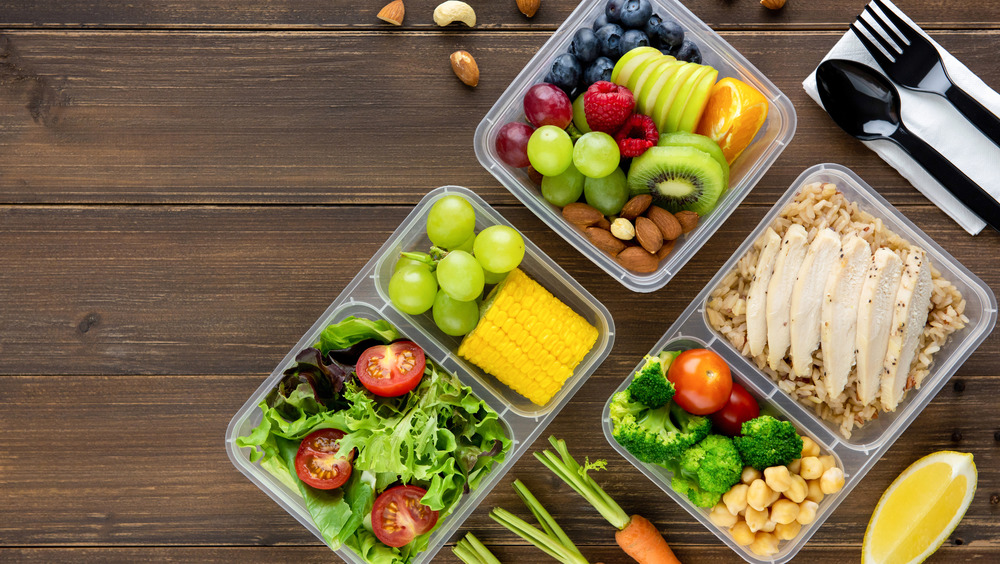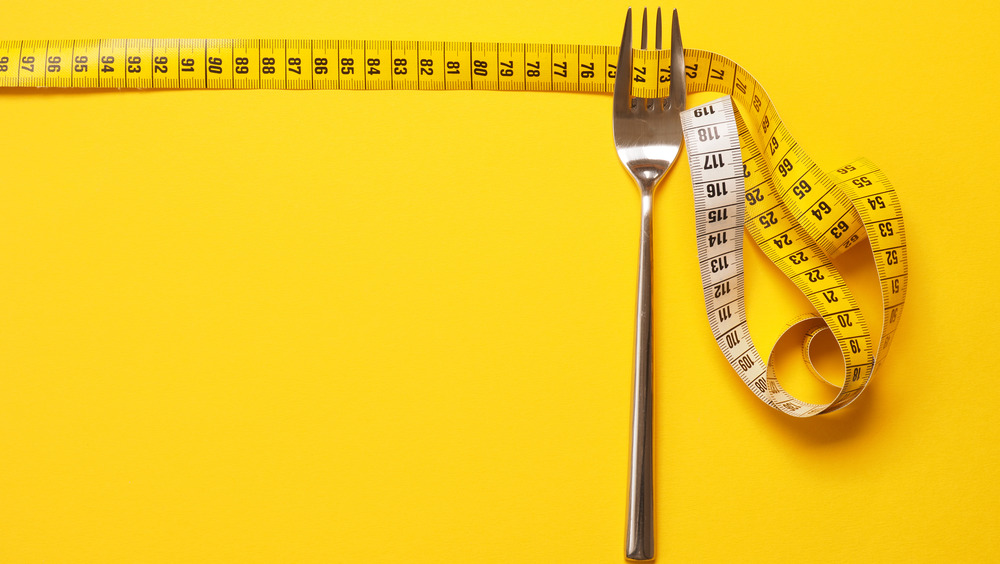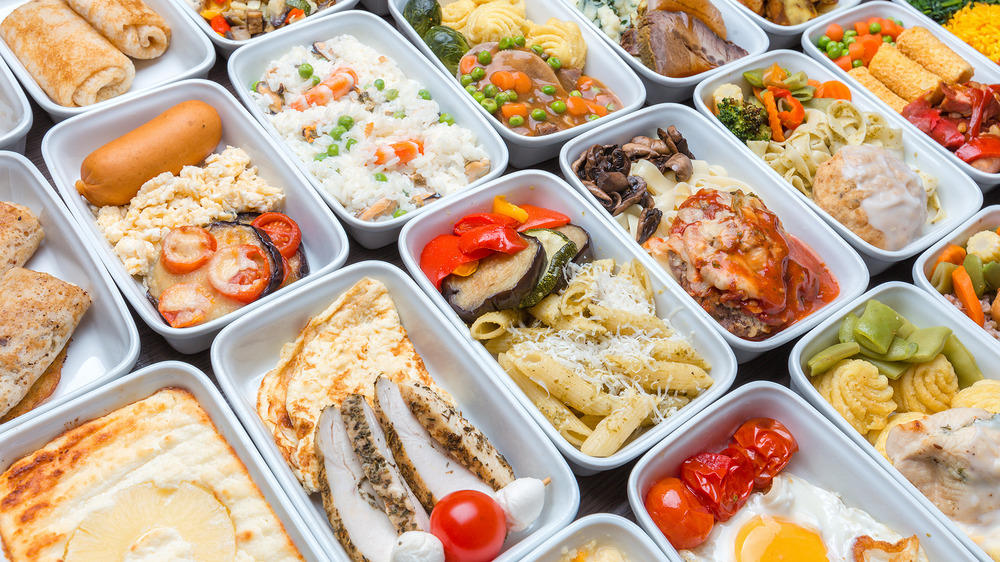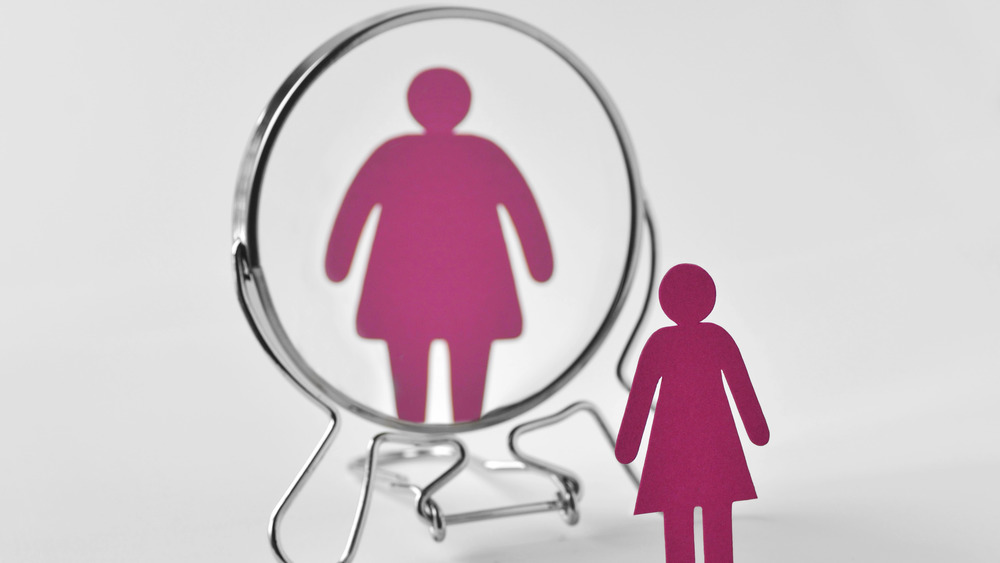The Truth About Nutrisystem
When you think of Nutrisystem, you probably think of Marie Osmond. Although not many people know the nitty-gritty details of the diet, so many of us recognize it as Osmond's chosen weight-loss program.
The longtime celebrity singer and TV show host joined the program more than a decade ago. She lost 50 pounds following the diet, which combines delivered frozen meals with fresh foods like fruits, vegetables, nuts, and dairy (via Nutrisystem). Nutrisystem is still available today, and Osmond remains the face of it.
Whether you've heard about Nutrisystem through a TV ad or word of mouth, you might be wondering how the plan actually works, and whether or not it's worth signing up for. Here, we'll go through exactly what you eat on the Nutrisystem diet, how much it costs, and what the Nutrisystem team claims the diet can do. We'll also examine the validity of those claims based on expert opinions and research. It's essential that you understand all of these things before you decide to give Nutrisystem a try. Just because it works for Osmond, that doesn't necessarily mean it will work for you.
Nutrisystem has been around since the early 1970s
Nutrisystem has been around since long before Marie Osmond started endorsing the brand. The Nutrisystem program was created in the 1970s by founder Harold Katz, former owner of the Philadelphia 76ers (via The Philadelphia Inquirer). Originally the program was centered around meal replacement shakes, similar to SlimFast. It later opened weight-loss centers. Finally in the 1990s, Nutrisystem became the service it is today, centered around frozen meals that get delivered directly to your door (via Houston Chronicle).
The financial success of Nutrisystem has ebbed and flowed through the years. In 2018, Nutrisystem sold to Tivity Health Systems of Nashville for a whopping $1.4 billion, The Philadelphia Inquirer reported. Then in October of 2020, Tivity unloaded the brand by selling it for $575 million to Dallas-based Kainos Capital (via The Dallas Morning News). Clearly, the brand wasn't worth nearly as much as Tivity initially thought, since they sold it for less than half of what they paid for it just 19 months prior. Still, Nutrisystem is a household name in the diet industry, and it's likely to stay that way for years to come.
On Nutrisystem, you get meals delivered to your house
The main premise of the Nutrisystem plan is that you get all of your main meals delivered directly to your house. Every four weeks, you'll get a shipment of breakfasts, lunches, dinners, and snacks (via Nutrisystem). Some plans include five of each meal per week, while others include seven. Some of the food is fresh, while some is shelf-stable. If you're on the seven-meals-per-week program, that means you'll be getting 28 breakfasts, lunches, and dinners every four weeks, plus snacks for each day. On the five-meals-per-week program, you'll get 20 of each.
It's important to take stock of how much space you have in your freezer and pantry. That's a lot of food to store at once! Before you sign up for a Nutrisystem program, make sure that you have enough room for all of those meals. You surely don't want to waste money on food that will go bad because of improper storage!
You'll supplement frozen meals with various fruits, vegetables, nuts, meat, and dairy from the grocery store
Although Nutrisystem is based around getting pre-made frozen meals delivered to your door, you'll still need to go grocery shopping for certain items. Nutrisystem provides a grocery guide specifying what you'll need to purchase at the store to supplement your meals.
In this guide, they list "PowerFuels," which include lean proteins, low-fat dairy, and nuts that they say will help you to feel full. They also list "SmartCarbs" including whole grains, beans, legumes, fruits, and starchy vegetables. There's a section for vegetables, along with the recommendation to eat at least four servings of non-starchy vegetables each day. Then, there's a list of "Free Foods," which includes condiments, drinks, and flavorings like coffee, tea, calorie-free sweeteners, spices, and salsa that are allowed on the Nutrisystem plan. Anything under 10 calories falls in this category, and can be eaten without moderation.
Finally, there are "Extras," which Nutrisystem says you can eat up to three servings of per day. These include things like avocado, honey, ketchup, pumpkin seeds, and oil. For most of these grocery items, Nutrisystem provides precise portion sizes and calorie measures for what's "allowed" on the plan. You can't just freely eat these foods, with the exception of "free foods."
Nutrisystem claims you can lose 13 pounds in your first month on the diet
The team at Nutrisystem claims that you can lose up to 13 pounds in your first month on the plan, although they specify that this result is not typical. They also claim that you can lose up to 7 inches (via U.S. News & World Report).
For starters, that much weight loss in one month isn't healthy. According to the Mayo Clinic, "healthy" weight loss is anywhere from one to two pounds per week, or about 8 pounds per month. If you lose weight more quickly than this, you're at risk of nutritional deficiencies from not eating adequate amounts of food. What's more, the Mayo Clinic also recommends that a realistic weight loss goal is about 5 percent of your current weight. For someone who weighs 200 pounds, 5 percent weight loss would be about 10 pounds overall — less than what the Nutrisystem claims you can lose in a single month!
The basic plan starts at about $9 per day
If you chose the basic Nutrisystem plan, you'll get one week of seven full days of meals and shakes. Then, you'll get an additional three weeks of five Nutrisystem meals and snacks per week; these weeks, you'll have to prepare your own meals for two days of the week, and buy various add-ons from the grocery guide to supplement the Nutrisystem meals (via Nutrisystem). Nutrisystem provides recipes for the meals that you'll prepare on your own.
Women on the plan will eat four Nutrisystem meals per day: breakfast, lunch, dinner, and a snack. Men will eat one additional snack per day. The monthly cost of the plan for women is $250 ($8.93 per day), and the monthly cost for men is $290 ($10.36 per day). Keep in mind, this doesn't include the two days worth of meals per week that you'll prepare on your own. This also doesn't include any foods from the grocery guide that you'll add to the Nutrisystem meals. Depending on what your current grocery budget is, Nutrisystem may be a fairly expensive option for you, especially for frozen food.
The all-inclusive, customizable plan starts at $12 a day
On the basic Nutrisystem plan, you're responsible for cooking two days worth of meals every week. If you'd rather not cook at all, the Uniquely Yours Nutrisystem plan includes seven days worth of Nutrisystem meals and snacks for four weeks. Most meals are frozen while some are fresh, and this plan gives you the option to choose your own meals instead of just getting a set menu, which means that you're guaranteed to only get food you like (via Nutrisystem). Like the basic plan, this one also starts with seven days of Nutrisystem meals and shakes designed to kick-start "fat burning."
Women on the plan will eat four Nutrisystem meals per day: breakfast, lunch, dinner, and a snack. The monthly cost of this plan for women is $360 (or $12.86 per day), which includes all meals and snacks but doesn't include necessary add-ons like the fruits, vegetables, and lean proteins outlined in the grocery guide.
Men on the plan will eat five Nutrisystem meals per day: breakfast, lunch, dinner, and two snacks. The monthly cost for men is $400 (or $14.29 per day). Again, this doesn't include anything from the grocery guide that you'll add to meals.
Nutrisystem is built around the glycemic index
Something that many people like about Nutrisystem is that everything is laid out for you. You don't have to plan meals, because they're either delivered to you or taken from Nutrisystem recipes. You don't have to think about portion sizes, because everything is measured.
Still, it's important to understand why Nutrisystem is designed the way that it is. According to experts at U.S. News & World Report, Nutrisystem is designed around the glycemic index, which they explain is "a measure of how various carbs affect your blood sugar." Carbohydrates that are high in fiber absorb more slowly into your bloodstream, meaning that your blood sugar doesn't spike or drop as much. Eating carbs along with fat and protein also helps prevent blood sugar spikes and dips.
On Nutrisystem, meals are designed to keep you full for longer and keep your blood sugar steady. They include high-fiber carbs that are low on the glycemic index, and all meals and snack contain a combination of fat, protein, and carbs. Still, the meals (and the plan overall) are pretty low in calories, so there's no guarantee that you'll never be hungry.
The plan is high in fruits and veggies
Experts take issue with many aspects of the Nutrisystem plan, but one thing that's nutritionally sound is the number of fruits and vegetables included. In the grocery guide that comes along with Nutrisystem plans, program followers are advised to eat at least four servings of non-starchy vegetables per day, plus daily servings of starchy vegetables and fruits. That's in line with the recommendation from the 2020-2025 Dietary Guidelines for Americans, which is to eat at least five fruits and vegetables per day. And, it's likely an improvement on what people were eating prior to starting the Nutrisystem plan, since only one in ten Americans actually eats adequate fruits and vegetables. according to the Centers for Disease Control and Prevention.
If you decide to try the Nutrisystem plan, make sure that you're following the recommendation to buy fresh fruits and vegetables at your local grocery store or farmers market, and add them to the pre-made meals. Not only will they add fresh texture and flavor to frozen meals, they'll also add fiber and other important nutrients that you shouldn't be going without!
You take a 30-second quiz to figure out your macros, based on your body shape
Nutrisystem programs are tailored to each individual, although the way that you figure out which plan is right for you isn't entirely scientific.
According to experts at U.S. News & World Report who reviewed the plan, subscribers take a 30-second quiz to determine their macronutrients and calorie level. The quiz asks about your gender, weight, age, goals, lifestyle, and activity level. It also asks you to identify your own body shape: Are you an apple, pear, rectangle, or hourglass?
Nutrisystem claims that "apple-shaped" people who carry weight in their mid-sections should eat high-protein diets and limit added sugars and other low-fiber carbs. "Pear-shaped" people who carry weight mostly on their hips "can enjoy a diet slightly higher in carbohydrates than other body types," according to the company. Although your body shape may play some role in your overall health, Nutrisystem does not reference any research to back up their claims, which is a reason to be wary. This type of approach to weight loss is also very appearance-focused, which can trigger negative body image thoughts for many people (via The Atlantic).
Nutrisystem is based around processed food, which experts do not recommend
Although Nutrisystem's frozen meals are made with nutritious ingredients, they're still processed foods. The same goes for their shakes. That's a problem for anyone hoping to try Nutrisystem as a way to improve their health.
Experts widely agree that processed food should not make up the bulk of your diet. According to a 2019 randomized controlled trial published in Cell Metabolism found that over the course of two weeks, subjects who were served a diet high in processed food ate more overall and consumed more carbs and fat (but not more protein) than subjects who were served a diet high in whole foods but containing the same amount of calories, sugar, sodium, fiber, and macronutrients. That means that a diet high in processed foods is likely to make you eat more than a diet high in whole foods.
Sure, Nutrisystem calls for adding fresh fruits, vegetables, lean proteins, and other nutrient-dense foods to pre-made meals. But it's still relatively high in processed foods, which isn't exactly healthy.
Nutrisystem is not very sustainable
A big red flag of the Nutrisystem plan is how difficult it can be to stick to. "Relying on a meal delivery service isn't sustainable for most people, so healthy, long-term habits are not learned," Kelly Plowe, registered dietitian, told Verywell Fit. Frankly, you're extremely unlikely to continue ordering these pre-made meals forever. Yet, the diet doesn't do much in the way of teaching you how to plan meals, choose healthy foods, or cook for yourself. Sure, some plans allow for two days worth of home-cooked meals per week, but the majority of your meals on the Nutrisystem diet are decided and prepared for you in advance.
While meal planning may seem like a hassle, it can set you up for long-term success. A 2017 study published in the International Journal of Behavioral Nutrition and Physical Activity looked at survey data from over 40,000 French adults and found that those who planned their meals were likely to have a more nutritious diet and eat a wider variety of foods than those who did not meal plan. In other words, knowing how to plan and cook your own meals is an easy way to eat more healthfully.
Nutrisystem will likely lead to short-term weight loss because it's a very low-calorie diet
Put simply, Nutrisystem is a low-calorie diet. According to Healthline, people on a Nutrisystem plan will eat an average of 1,200 to 1,500 calories per day. For most people, this leads to weight loss. A study by The Center for Applied Health Sciences and sponsored by Nutrisystem followed 84 adults for 12 weeks. Half of the participants were assigned to Nutrisystem, while the other half followed the DASH diet. The study found that those on the Nutrisystem plan lost, on average, twice as much weight in the 12 weeks as those on the DASH diet.
However, there's currently no evidence that the diet leads to long-term weight loss. In a 2020 review of 14 popular diet programs published in The BMJ, researchers reviewed 121 existing studies and concluded that while pretty much all low-calorie diets lead to short-term weight loss, the vast majority of people regain all lost weight back within a year. Although Nutrisystem wasn't one of the diets reviewed here, the findings are no doubt representative of many low-calorie diets.
Nutrisystem is extremely restrictive, which can lead to long-term weight gain
Averaging between 1,200 and 1,500 calories per day, the Nutrisystem is extremely calorically restrictive. It's also restrictive in the sense that certain foods are allowed while others are limited. And these factors do not bode well for long-term health.
In a 2015 article published in the International Journal of Obesity, the authors explained that long-term calorie restriction can slow metabolic rate (aka how many calories you burn per day), reduce fat oxidation (the process of burning stored fat for energy), and increase hunger-inducing hormones. All of this makes long-term weight loss extremely difficult, but can also lead to weight gain.
Instead of following a super low-calorie diet, you may want to consider working with a registered dietitian to figure out how your nutrition can help you achieve your goals. Or, focus on following the general advice outlined in the 2020-2025 Dietary Guidelines for Americans: Eat at least five servings of fruits and vegetables per day, get most of your grains from whole grains, don't go overboard with sugar and saturated fat, and choose healthy fats and protein sources. These pieces of advice are flexible and sustainable.
Nutrisystem may increase your risk of an eating disorder
Many experts, like Catherine Loria, a nutritional epidemiologist at the National Heart Lung and Blood Institute, discourage dieting altogether and instead encourage sustainable eating habits (via The Baltimore Sun). Restrictive diets, like Nutrisystem, can be particularly dangerous as they may increase your risk of an eating disorder or disordered eating.
According to a 2016 clinical trial published in the Journal of Abnormal Psychology, a history of dieting was found to be a significant risk factor for eating disorders and disordered eating. Similarly, the National Eating Disorders Association (NEDA) lists dieting as a risk factor for binge eating. The association also explained that negative energy balance (aka a low-calorie diet) resulting in weight loss can kick-start an eating disorder. Frankly, this is reason enough to steer clear of Nutrisystem and other low-calorie diets.
If you are struggling with an eating disorder, or know someone who is, help is available. Visit the NEDA website or contact NEDA's Live Helpline at 1-800-931-2237. You can also receive 24/7 Crisis Support via text (text NEDA to 741741).















